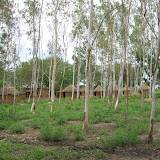May 10-14, 2010; Kita CESREF, Mali
Cervical cancer continues to present itself as one of the most devastating diseases plaguing women in the developing world, and despite its worldwide drop in incidence rates due to technologies such as Papilioma smears and colposcopy, it has risen to the deadliest cancer among women in Mali due to lack of access to these tools. To initiate an attack against cervical cancer, a four-day formation was held from May 10-14 to train 35 doctors and 37 matrones from the rural health centers (CSCOMs) in the Cercle of Kita in a process known as visual inspection.
Visual inspection using acetic acid (VIA) or Lugol’s iodine (VILI) is an easy and accessible way to screen for precancerous cells, which when found can be treated to prevent the growth of invasive cervical cancer. Acetic acid or Lugol’s iodine is applied directly to the cervix, and any precancerous cells turn white (in the case of acetic acid) or yellow (with Lugol’s iodine) upon application. These positive results can be seen using a flashlight, and can be diagnosed by any healthcare worker with minimal training.
The first two days of the formation was held with the doctors from each of the 35 CSCOMs in the Kita Cercle, and the final two days was held with 37 matrones from the 35 CSCOMs. Sessions were facilitated by doctors and sage femmes (clinical midwives) from the local CSREF, who had recently received training from Dr. Tekete, a specialist at Gabriel Toure University Hosptial in Bamako. The first day of each training consisted of lectures on the epidemiology of cervical cancer, as well as its incidence occurrence and current available preventative treatment methods. Using visual aids, the participants were trained in the recognition of precancerous and cancerous lesions on the cervix, as well as positive screenings using VIA and VILI and general infections of the cervix. The participants practiced preparing the acetic acid solution, and went over forms used during and after the screening procedure.
The second day of the formation for both groups consisted of practical screenings using volunteers from the CSREF and two of the local Kita CSCOMs in Darsalam and Mardiakambougou. The participants took turns questioning the patients, preparing the solutions, applying the acetic acid and Lugol’s iodine, and assessing the result. Afterwards, they counseled the patient and completing necessary paperwork. The participants were instructed in steps to take during a positive screening, which in general included referring patients to the CSREF in Kita, where they perform a biopsy to be analyzed prior to treatment. Over both sessions 22 women were screened, with 5 positive cases where biopsies were taken to be analyzed.
Throughout the formation the importance of early, regular screening was stressed. Each of the 35 CSCOMs received a speculum, a placental probe, 50 ml of 100% acetic acid and 200 ml of Lugol’s iodine, provided for through Peace Corps and outside donations. All participants were urged to perform these newly acquired skills during their regular practice at their health centers, with an emphasis on screening during regular pre- and post-natal consultations. Finally, the healthcare workers were encouraged to set up regular village-wide screening campaigns, and to continue to ask for help if they are lacking supplies or adequate training. To conclude the training, a questions and answer session was held to ensure comprehension, and participants left with an encouraging assessment of the skills they had gained.





>




This comment has been removed by the author.
ReplyDeleteAs commanded......you are repairing the world.
ReplyDeleteA very humble 'thank you'.
xxx's